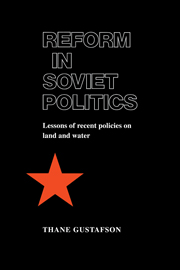Book contents
- Frontmatter
- Contents
- Preface
- Map of Soviet Russia showing major hydropower sites
- 1 Challenge of the third generation of Soviet power
- 2 Building authority around a new agricultural policy
- Part I Advice and dissent in the shaping of Brezhnev's agricultural and environmental programs
- Part II Implementation of the Brezhnev programs
- Notes
- Index
Part I - Advice and dissent in the shaping of Brezhnev's agricultural and environmental programs
Published online by Cambridge University Press: 04 August 2010
- Frontmatter
- Contents
- Preface
- Map of Soviet Russia showing major hydropower sites
- 1 Challenge of the third generation of Soviet power
- 2 Building authority around a new agricultural policy
- Part I Advice and dissent in the shaping of Brezhnev's agricultural and environmental programs
- Part II Implementation of the Brezhnev programs
- Notes
- Index
Summary
If the formation of political coalitions in the Soviet elite depends more strongly today than in the past on consensus on policy, if the authority of the leader rests increasingly on his ability to persuade, build alliances, and show results, then the position of technical advisers and critics, and also that of their agencies, is bound to be altered. As we shall see in Part I of this book, the last fifteen years have been a time of growing official receptiveness to the ideas and recommendations of experts and specialists of a great many kinds. But does this imply a lasting alteration in the way policies are formed in the Kremlin? Does the increased participation of technical experts give them influence or even power? Have technical specialists really played an important role in shaping the Brezhnev policies? These are the questions raised in the next four chapters.
We first take up three cases of the participation of technical specialists in the expansion of the Brezhnev policy. The first case deals with the rise of environmental issues to political respectability and an official place in policy, culminating in a major clean-water program in the southern half of the Soviet Union, an essential long-term part of the southern strategy. The second is the story of the revival of an official price on capital and the role it played in displacing old dogma about resource use and in humbling one of agriculture's most important competitors. The third is a unique case of technology assessment: a lengthy public debate over proposals to reroute northern waters to southern basins to supply water to agriculture and industry.
- Type
- Chapter
- Information
- Reform in Soviet PoliticsThe Lessons of Recent Policies on Land and Water, pp. 35 - 38Publisher: Cambridge University PressPrint publication year: 1981



